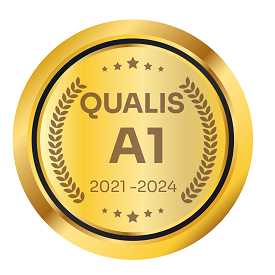Impacto del aprendizaje cooperativo en el rendimiento académico de los estudiantes de especialidades socioeconómicas
DOI:
https://doi.org/10.22633/rpge.v26iesp.2.16552Palabras clave:
Aprendizaje cooperativo, Tecnologías CL, Aprendizaje de estudiantes, Educación superior, Rendimiento académicoResumen
El presente estudio tiene como propósito implementar la tecnología de CL en el proceso de aprendizaje de los estudiantes de las especialidades socio-humanitarias y económicas y probar su efectividad en la formación profesional de los estudiantes a partir de los resultados de las pruebas académicas intermedias y las calificaciones finales del curso. Se realiza un estudio experimental centrado en el análisis comparativo de los resultados de aprendizaje en estudiantes de diferentes especialidades. Los resultados de aprendizaje se evalúan según dos criterios: las puntuaciones de los estudiantes en las pruebas académicas intermedias y sus calificaciones finales. A diferencia de otras tecnologías, CL demuestra componentes positivos: altos resultados en el dominio de conocimientos y obtención de habilidades y destrezas; los participantes aprenden a cooperar; aumenta la motivación de aprendizaje, se desarrollan las relaciones personales entre los estudiantes; el nivel de las actividades educativas mejora. El uso de la tecnología CL es un medio eficaz de formación profesional de los estudiantes en especialidades socio-humanitarias y económicas, ya que mejora significativamente el rendimiento en las pruebas intermedias y las calificaciones finales del curso.
Descargas
Citas
DAVIDSON, N.; MAJOR, C. H. Boundary crossings: Cooperative learning, collaborative learning, and problem-based learning. Journal on Excellence in College Teaching, v. 25, n. 3/4, p. 7-55, 2014.
DENISOVA, D. A.; LEVANOVA, N. G.; EVGRAFOVA, I. V., VERKHOVOD, A. S. Formation of cognitive activity of technical university students using elements of blended learning in the study of quantum physics. Revista Tempos E Espaços Em Educação, v. 14, n. 33, e15296, 2021.
EBRAHIM, A. The effect of cooperative learning strategies on elementary students’ science achievement and social skills in Kuwait. International Journal of Science and Mathematics Education, v. 10, p. 293-314, 2012.
GOLUBEVA, T. I. et al. The impact of visualization tools in distance english language learning: the experience of the russian university teachers. Revista Tempos E Espaços Em Educação, v. 14, n. 33, e16111, 2021.
HUANG, M.; HSIAO, W.; CHANG, T.; HU, M. Design and implementation of a cooperative learning system for digital content design curriculum: Investigation on learning effectiveness and social presence. TOJET, v. 11, n. 4, p. 94-107, 2012.
JACOBS, G. M. Collaborative learning or cooperative learning? The name is not important; flexibility is. Beyond Words, v. 3, n. 1, p. 32-52, 2015.
JACOBS, G. M.; LOH, W. I. Using cooperative learning in large classes. In: CHERIAN, M.; MAU, R. (Eds.). Large classes. Singapore: McGraw-Hill, 2003. p. 142-157.
JOHNSON, D. W.; JOHNSON, R. T. Cooperative learning and achievement. In: SHARAN, S. (Ed.). Cooperative learning: Theory and research. New York: Praeger, 1990, p. 23-37.
JOHNSON, D. W.; JOHNSON, R. T.; SMITH, K. The state of cooperative learning in postsecondary and professional settings. Educational Psychology Review, v. 19, p. 15-29, 2007.
KHAN, S. A.; AHMAD, R. N. Evaluation of the effectiveness of cooperative learning method versus traditional learning method on the reading comprehension of the students. Journal of Research and Reflections in Education, v. 8, n. 1, p. 55-64, 2014.
KOROTAEVA, I. E.; KAPUSTINA, D. M. Features of the educational process organization in foreign language classes with students of non-linguistic specialties when switching to distance learning. Revista EntreLinguas, v. 7, esp. 4, e021075, 2021.
LÓPEZ-CANCELOS, R.; COMESAÑA, R.; BADAOUI, A. Analysis of workgroup experience using the cooperative learning in engineering degrees in the European higher education area. In: EDULEARN13 Proceedings. Barcelona, Spain: IATED, 2013. ISBN: 978-84-616-3822-2. p. 6638-6646.
ONWUEGBUZIE, A. J.; COLLINS, K. M. T.; JIAO, Q. G. Performance of cooperative learning groups in a postgraduate education research methodology course. Active Learning in Higher Education, v. 10, no. 3, p. 265-277, 2009.
PROKHOROVA, M. P. et al. Aprendizado invertido: análise de dificuldade e intensidade. Laplage Em Revista, v. 7, no. Extra-E, p. 51-59, 2021.
SAMUEL, S. Cooperative Learning. University News, v. 48, p. 5-9, 2010.
SHARAN, Y. Cooperative Learning for Academic and Social Gains: valued pedagogy, problematic practice. European Journal of Education, v. 45, n. 2, p. 300-313, 2010.
SHARAN, Y. Learning to cooperate for cooperative learning. Anales de Psicología, v. 30, n. 3, p. 802-807, 2014.
SHIMAZOE, J.; ALDRICH, H. Group work can be gratifying: Understanding and overcoming resistance to cooperative learning. College Teaching, v. 58, p. 52-57, 2010.
SILVA, R.; FARIAS, C.; MESQUITA, I. Cooperative Learning Contribution to Student Social Learning and Active Role in the Class. Sustainability, v. 13, p. 8644, 2021.
SOROKOVA, M. G. Matematicheskie metody v psikhologo-pedagogicheskikh issledovaniiakh: Uchebnoe posobie [Mathematical methods in psychological and pedagogical research: Textbook]. Moscow: Neolit, 2020.
STRIJBOS, J. W. Assessment of collaborative learning. In: BROWN, G.T.L.; HARRIS, L. (Eds.). Handbook of social and human conditions in assessment. New York: Routledge, 2016. p. 302-318.
THAKRAL, P. Cooperative Learning: An Innovative Strategy to Classroom Instruction. Learning Community, v. 8, n. 1, p. 17-22, 2017.
TSAY, M.; BRADY, M. A case study of cooperative learning and communication pedagogy: Does working in teams make a difference? Journal of the Scholarship of Teaching and Learning, v. 10, n. 2, p. 78-89, 2010.
YAMARIK, S. Does Cooperative Learning Improve Student Learning Outcomes? The Journal of Economic Education, v. 38, n. 3, p. 259-277, 2007.
YI, Z.; LU, X. Z. Implementing a cooperative learning. Educational studies, v. 38, n. 2, p. 165-173, 2012.
Publicado
Cómo citar
Número
Sección
Licencia
Derechos de autor 2022 Revista on line de Política e Gestão Educacional

Esta obra está bajo una licencia internacional Creative Commons Atribución-NoComercial-CompartirIgual 4.0.
Manuscritos aceitos e publicados são de propriedade da Revista on line de Política e Gestão Educacional. É vedada a submissão integral ou parcial do manuscrito a qualquer outro periódico. A responsabilidade do conteúdo dos artigos é exclusiva dos autores. É vedada a tradução para outro idioma sem a autorização escrita do Editor ouvida a Comissão Editorial Científica.











